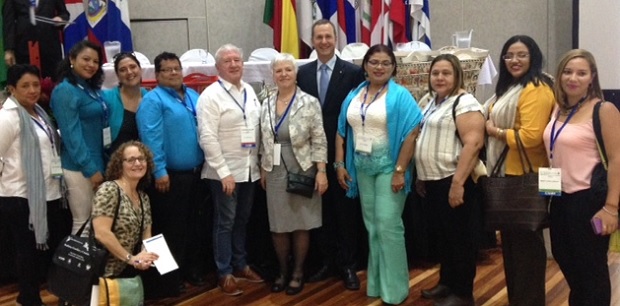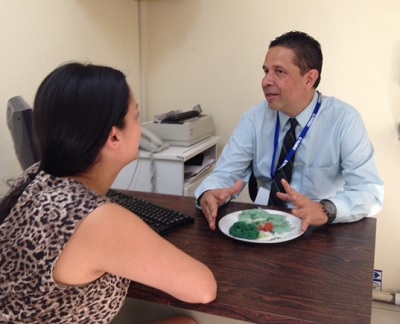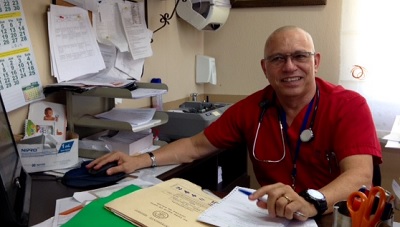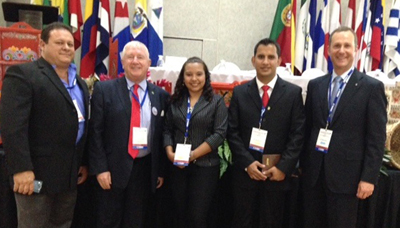From the President: Family Medicine in Costa Rica
 Photo: Delegates from Nicaragua, with WONCA president, president-elect and CEO, at the 1st WONCA Mesoamericano Congress
Photo: Delegates from Nicaragua, with WONCA president, president-elect and CEO, at the 1st WONCA Mesoamericano Congress
español français
Alejandro Alvarez is a family physician working in the town of Barva in
provincial Costa Rica. Alejandro works with his large primary care
team, providing community-based health care services to a population of
45,000 people in Barva and the surrounding rural areas. His clinic team
includes 10 general practitioners (GPs), primary care nurses, health
promotion staff, community dental services and a social worker,
dietician, and psychologist.

Photo: Dr Alejandro Alvarez, Family Physician at the Barva Health Clinic in provincial Costa Rica
Alejandro’s clinic also serves a network of ten Basic Primary Health
Care Teams, working out of clinics based in rural communities, with each
team comprising a GP, a primary care nurse and a primary care
technician. The primary care technician is a skilled and well-supported
community health worker, who visits every house in the local community,
identifying people at risk and referring them to the GP and nurse,
gathering data for health planning and resource allocation, and
implementing basic health interventions such as vaccination programs.
There is a current strong focus on preventing mosquito-borne illnesses
due to dengue, zika and chikungunya viruses.
Costa Rica (Spanish for the Rich Coast) is a small country of 4.5
million people in Central America, bordered by Panama to the South,
Nicaragua to the north, the Pacific Ocean to the west, and the Caribbean
Sea to the east. It is renowned for the remarkable biodiversity of its
wildlife, for its coffee and chocolate, and for its national commitment
to the use of clean technology and reversal of past environmental
degradation. It is also well known for its effective model of primary
health care, ensuring universal health coverage, with health care for
all delivered by community-based health teams. Each Basic Primary Health
Care Team provides care for around 4,000 people and there are now teams
covering the entire population, ensuring that all citizens have
equitable access to health care services.
 Photo: Dr Jose Martin Rojas Castro, general practitioner at the Basic
Primary Health Clinic in the rural community of San José de la Montaña
Photo: Dr Jose Martin Rojas Castro, general practitioner at the Basic
Primary Health Clinic in the rural community of San José de la Montaña
The national social security insurance program of Costa Rica dates back
to the 1940s, and the nation ensures free primary care and hospital care
for people in rural areas, those on low incomes, and vulnerable
populations including mothers and children, indigenous people, the
elderly and those with disability. A single health insurance scheme for
all people means that Costa Rica avoids some of the health care
inequities that occur in some other nations in this part of the world.
The nation’s health care budget is also augmented by taxation on soft
drinks and alcohol.
I was in Costa Rica to participate in the 6th Iberoamericana Family and
Community Medicine Summit (Cumbre in Spanish), hosted in the capital
city, San José, by the Association of Family and Community Medicine of
Costa Rica, and our WONCA Iberoamericana CIMF Region, which includes the
Spanish speaking nations of Central and South America, as well as
Brazil, Portugal and Spain. 164 delegates from 23 countries came
together to discuss the role of Family Medicine in ensuring
universality, equity and quality in health systems across the region.
Waynakay, our WONCA Young Doctor Movement in Central and South America,
was also well represented, ensuring the voice of the next generation of
family doctors in the deliberations.
The outcome report of the Summit is the Letter of San José (La Carta de
San José), which I was invited to sign along with Dr Fernando Llorca
Castro (Minister of Health of Costa Rica), Professor Inez Padula
Anderson (our WONCA Iberoamericana Regional President), Dr Thomas Meoño
Martín (President of the Summit) and representatives of the Costa Rica
Social Security program, and the Pan American Health Organization (PAHO)
of the World Health Organization. The Letter of San José will be
published in Spanish and English on the WONCA website.
The Summit was followed by WONCA’s first-ever Central American Family
Medicine Conference (Congreso Mesoamericano de Medicine Familiar y
Comunitaria) where delegates shared developments in family medicine
clinical care, education and research in each of the nations of the
region.
 Photo: Dr Alexander Paz (in red tie), WONCA’s first direct member from
Honduras, with WONCA president and CEO and other delegates from Honduras
Photo: Dr Alexander Paz (in red tie), WONCA’s first direct member from
Honduras, with WONCA president and CEO and other delegates from Honduras
I was impressed with the primary health care system in Costa Rica and
the potential for family doctors to make further contributions. Costa
Rica has the second longest life expectancy in the Americas, following
Canada, with current life expectancy at birth of 81.5 years for females
and 76.7 years for males. Yet challenges remain, especially with the
rise in non-communicable diseases, and the complex co-morbidities that
accompany an increasingly elderly population. This is where family
medicine offers great hope for the future with an increasing cohort of
trained specialist family doctors providing effective leadership of the
networks of primary health care services, ensuring the provision of
coordinated, comprehensive, integrated care for all people.
The family doctors in Costa Rica ensure that health care costs are kept
low through appropriate referral to consultant services only when
indicated, that essential health information is made available between
health care providers to support quality care, and that there is
efficient and effective integration of primary, secondary and tertiary
care services.
Michael Kidd
President
World Organization of Family Doctors (WONCA